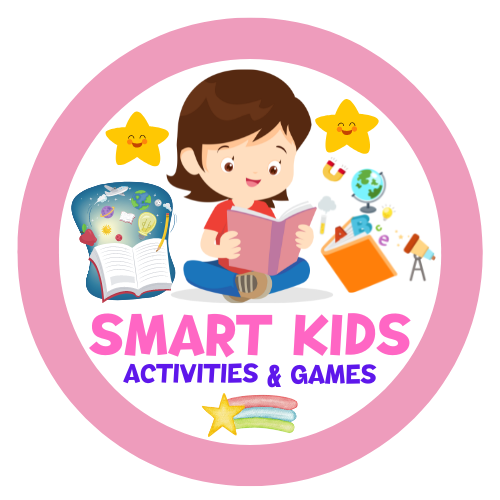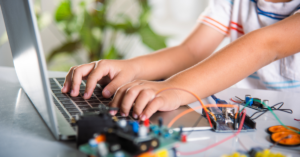Key Takeaways
- AI in kids’ education offers personalized learning experiences tailored to individual needs.
- AI tools provide valuable insights and assistance to teachers, enhancing their teaching practices.
- AI enhances accessibility in education, ensuring all students can benefit from adaptive and personalized tools.
- AI can improve learning outcomes and increase student engagement.
- AI has the potential to transform traditional education models and create more inclusive and adaptive learning experiences for children.
The Growing Role of AI in Education
The education industry is harnessing the power of artificial intelligence (AI) to revolutionize traditional classrooms and enhance the learning experience for both students and educators. With its ability to create personalized, inclusive, and adaptive learning environments, AI is reshaping the way we educate our children. By integrating AI into kid’s education, we can provide students with individualized learning paths that cater to their unique needs and abilities. AI-powered platforms can analyze student data, identify areas of strength and weakness, and develop personalized learning plans that optimize their educational journey. Furthermore, AI can support teachers in providing targeted feedback and assistance to students. With AI-powered tools, educators can gain deeper insights into student performance, identify areas for improvement, and adapt their teaching methods accordingly. This enables teachers to overcome challenges in the classroom and create an engaging and effective learning environment. But AI doesn’t stop at individualized learning paths and targeted feedback. It also enables a shift away from traditional classroom models. With AI-powered learning for kids, education becomes dynamic and interactive, promoting active participation and deeper understanding. As we embrace the growing role of AI in education, we open doors to new possibilities and opportunities for our children. By embracing technology and harnessing the power of AI, we can create a future where education is personalized, inclusive, and adaptive, enabling students to unlock their full potential.AI Tools and Applications in Education
Artificial Intelligence (AI) has revolutionized the education landscape by providing innovative tools and applications that enhance the learning experience for children. These AI-powered tools are designed to cater to the unique needs and learning styles of each student, making education more engaging, personalized, and effective. One of the key AI tools used in education is Intelligent Tutoring Systems. These systems leverage AI algorithms to provide personalized feedback and support to students, helping them grasp complex concepts and improve their learning outcomes. Another crucial application of AI in education is automated grading and assessment systems. These systems alleviate the workload on educators by automating the grading process while providing targeted support to students. They ensure consistent and objective evaluation, saving valuable time that can be invested in personalized teaching. Chatbots and virtual assistants are also widely used AI tools in the education sector. These intelligent systems offer students instant support and assistance, available round-the-clock. They provide answers to queries, offer explanations, and guide students through their learning journey, promoting independent learning and self-confidence. Predictive analytics is another area where AI is making significant contributions in education. By analyzing student data, AI algorithms can identify early signs of challenges or difficulties that students may face. This allows educators to provide timely interventions and personalized support to ensure the success of every student. AI is also used for curriculum planning, learning analytics, content recommendation, proctoring, and language learning. These diverse applications of AI in education demonstrate its versatility in catering to different areas of learning and ensuring a holistic educational experience.Smart AI Tools Enhancing Learning Experiences
AI-powered tools are transforming the traditional classroom environment by offering interactive and immersive learning experiences. These tools engage students in a more dynamic and meaningful way, fostering a deeper understanding of the subject matter. With AI, students can explore and learn at their own pace, allowing for a personalized and adaptive learning journey. Additionally, AI tools promote critical thinking, problem-solving skills, creativity, and collaboration, which are crucial in today’s rapidly evolving world. By integrating AI into kids’ education, we equip them with the necessary skills to thrive in the digital age and prepare them for future challenges and opportunities.AI Tools and Applications in Education
| AI Tool/Application | Description |
|---|---|
| Intelligent Tutoring Systems | AI-powered systems that provide personalized feedback and support to students. |
| Automated Grading and Assessment Systems | AI-driven systems that automate the grading process and offer targeted support to students. |
| Chatbots and Virtual Assistants | Intelligent systems that provide instant support and assistance to students 24/7. |
| Predictive Analytics | AI algorithms that analyze student data to identify challenges and provide timely interventions. |
| Curriculum Planning, Learning Analytics, Content Recommendation | AI-driven tools that support curriculum development, analyze learning data, and recommend relevant content. |
Enhancing Personalized Learning with AI
One of the key benefits of AI in education is its ability to enhance personalized learning. By leveraging AI-powered learning platforms, educators can analyze student data to provide tailored content and delivery methods that are based on individual needs and preferences. This personalized approach allows students to learn more efficiently and effectively, ultimately leading to better learning outcomes. AI also opens doors for students with language or sensory impairments, making learning more accessible and interactive. Through AI, opportunities for people worldwide to exchange knowledge and learn interactive materials are made possible. This not only enhances the learning experience but also promotes inclusivity and equal access to education.AI in Educational Research and Analytics
Artificial Intelligence (AI) is revolutionizing educational research and analytics by analyzing vast amounts of data at a faster and more accurate pace. This transformative technology provides valuable insights into various aspects of education, including student learning, teacher effectiveness, and overall educational performance. Through data analysis, AI can uncover patterns in student behavior, detect trends, and identify areas where teaching methods can be improved. This enables educators to make data-driven decisions and tailor their instructional approaches to meet the unique needs of their students. Furthermore, AI can analyze data from online learning platforms to optimize instruction and identify effective resources. By leveraging AI-powered analytics, educators can gain a deeper understanding of student engagement, progress, and areas where additional support may be required.“AI-driven analytics allows educators to make data-driven decisions, ensuring that teaching methods are effective and tailored to individual student needs.”By harnessing the power of AI in educational research and analytics, educators can unlock valuable insights that can inform instructional strategies and improve student outcomes. AI-driven analytics facilitate evidence-based decision-making and empower educators to create more impactful learning experiences.
The Benefits of AI in Educational Research and Analytics:
- Enhanced data analysis capabilities: AI enables educators to analyze large volumes of data quickly and accurately, allowing for more efficient research and analysis.
- Improved decision-making: AI-driven insights provide educators with a comprehensive understanding of student performance and inform instructional strategies that lead to improved outcomes.
- Personalized instruction: By analyzing student data, AI can help educators tailor instruction to meet individual student needs, promoting a more personalized learning experience.
- Optimized resource allocation: AI-powered analytics can identify effective educational resources and enable educators to allocate resources more efficiently.
Future Trends in AI Implementation
As artificial intelligence (AI) continues to advance, its implementation in education holds promising trends for the future. AI has the potential to further enhance personalized learning experiences by leveraging student data and preferences. This ensures that each student receives tailored educational content and delivery methods that cater to their unique needs and learning style. By integrating AI into kid’s education, educators can effectively address the individual needs of students and foster greater engagement in the learning process. In the coming years, virtual and augmented reality tools are set to revolutionize the educational landscape by offering more interactive and immersive learning experiences. These cutting-edge technologies will enable students to engage with educational content in a dynamic and hands-on manner, facilitating a deeper understanding of the subject matter. Moreover, AI will play a crucial role in addressing the technology gap in the education system by upskilling both students and educators. By equipping them with the necessary digital skills, AI curriculum for children can empower them to thrive in a tech-driven world and take advantage of the opportunities presented by emerging technologies. The growth of the AI education market is also expected to surge in the future, reflecting the increasing demand for innovative and effective educational solutions. This growth will bring about wider accessibility and availability of AI-powered tools and resources, ensuring that more students can benefit from the advantages offered by AI integration in education. Overall, the future trends in AI implementation in education indicate a transformative shift towards more personalized, immersive, and inclusive learning experiences. With continuous advancements in AI technology, the potential for improving education becomes limitless.| Trend | Description |
|---|---|
| Personalized Learning | AI will further enhance personalized learning experiences based on student data and preferences. |
| Virtual and Augmented Reality | Virtual and augmented reality tools will create more interactive and immersive learning experiences. |
| Addressing the Technology Gap | AI will focus on upskilling students and educators to close the technology gap in education. |
| Growth of the AI Education Market | The AI education market is expected to grow significantly, leading to wider availability and accessibility of AI-powered tools. |
Improving Accessibility with AI-powered Tools
AI-powered tools are revolutionizing education by enhancing accessibility and providing support to students with diverse needs. These tools leverage artificial intelligence to offer adaptive and personalized solutions, making education more inclusive and equitable. One such tool is Presentation Translator, which generates real-time subtitles in multiple languages to aid students who are non-native English speakers or have hearing impairments. Another invaluable tool is the use of AI-powered chatbots and virtual tutors, which provide instant support and guidance to students, anytime and anywhere. These virtual assistants can offer clarification on concepts, answer questions, and assist with assignments, enabling students to receive personalized assistance at their own pace. By incorporating AI-powered tools into the learning environment, education becomes more accessible to students with disabilities who may require additional support and accommodations. These tools can facilitate engagement, boost confidence, and empower students to achieve their full potential.Benefits of AI-powered Tools for Kids Education
AI-powered tools in education bring numerous benefits, particularly for kids. These tools:- Enhance Personalized Learning: AI-driven tools adapt to individual learning styles and preferences, providing a customized learning experience for each child.
- Promote Inclusive Learning: AI-powered tools support students with disabilities, multilingual learners, and other diverse needs, ensuring that no child is left behind.
- Improve Engagement: Interactive and adaptive AI-powered tools capture children’s interest and foster active participation, leading to increased engagement and motivation.
- Support Progress Tracking: AI algorithms can analyze student performance data and provide valuable insights to both educators and parents, allowing for targeted interventions and personalized feedback.
| Key Takeaways |
|---|
| AI-powered tools enhance accessibility by providing adaptive and personalized support to students with diverse needs. |
| Tools like Presentation Translator generate real-time subtitles in multiple languages, benefiting non-native English speakers and students with hearing impairments. |
| AI-powered chatbots and virtual tutors offer instant assistance, ensuring students receive personalized support at their convenience. |
| AI-powered tools promote engagement, inclusivity, progress tracking, and personalized learning, benefiting kids in their educational journey. |
Enhancing Teaching Practices with AI
Artificial intelligence (AI) has the potential to revolutionize teaching practices by providing valuable insights and support to educators. With the help of AI tools, teachers can automate administrative tasks, grading, and assessment, freeing up more time for instruction and personalized attention to students. Intelligent tutoring systems powered by AI offer real-time feedback and support to students, providing personalized learning experiences. These systems adapt to students’ individual needs and offer guidance and assistance tailored specifically to them. This fosters engagement and promotes deeper understanding of the subject matter. AI can also assist teachers in content creation and updating. By analyzing student performance and engagement data, AI can identify areas that need improvement and suggest updates to lesson plans and materials. This ensures that lessons remain up-to-date and relevant, enhancing the overall learning experience. Additionally, AI’s ability to analyze educational research and analytics data can help teachers optimize their teaching methods. By analyzing student performance data, AI can identify patterns and trends, allowing teachers to make data-driven decisions and tailor their instruction to better meet the needs of their students. This leads to more effective teaching practices and improved learning outcomes.“AI tools have the potential to empower teachers by augmenting their skills and knowledge, enabling them to provide more individualized and effective instruction. By automating administrative tasks and offering personalized support, AI enhances the teaching experience for both educators and students.”The integration of AI in educational research and analytics enables teachers to gain valuable insights into student learning and overall educational performance. With AI’s help, teachers can identify areas where students are struggling and provide targeted interventions. This promotes continuous improvement and ensures that every student receives the support they need to succeed. In summary, AI tools and technologies have the potential to enhance teaching practices by providing valuable insights, automating administrative tasks, offering personalized support, and optimizing instruction. By harnessing the power of AI, teachers can create more engaging and effective learning experiences, ultimately improving the outcomes of their students.
Addressing Challenges and Concerns
While integrating AI into kids’ education brings about numerous benefits, there are also challenges and concerns that need to be addressed to ensure its successful implementation and usage.Data Privacy and Security Risks
One of the key challenges of AI in education is the need to effectively manage data privacy and security risks. As AI-powered tools collect and analyze student data, it is crucial to ensure that this data is protected and safeguarded against unauthorized access and potential breaches.Potential for Inappropriate or Biased Output
Another concern is the potential for AI to produce inappropriate or biased output. To prevent this, it is important to monitor and evaluate AI algorithms to ensure fairness and accuracy. Educators must work to eliminate any bias in AI recommendations and algorithms to create an inclusive and equitable learning environment.Involvement of Educators and Training
To successfully integrate AI into kids’ education, it is essential to involve educators in the decision-making process. This includes providing them with appropriate training and support to effectively utilize AI tools in the classroom. Educators need to be equipped with the knowledge and skills necessary to leverage AI to enhance teaching and learning experiences.“Ensuring data privacy, monitoring for bias, and involving educators in the decision-making process are crucial for the successful integration of AI in kids’ education.”
AI and the Future of Teaching & Learning
Artificial Intelligence (AI) is set to transform the future of teaching and learning, as it becomes increasingly integrated into children’s education. The U.S. Department of Education is at the forefront of developing policies and support systems to ensure the effective and safe use of AI in education. Their focus is on aligning AI models with a shared vision for education and emphasizing the involvement of humans in the decision-making process. The implementation of AI in education should be designed based on modern learning principles, with a strong emphasis on the importance of trust and collaboration between educators and AI systems. By integrating AI into kid’s education, we can unlock the full potential of AI technology to enhance the learning experience and cater to the unique needs of every student. In the fast-paced digital world, the importance of AI in kid’s learning cannot be underestimated. AI-powered tools can provide personalized learning experiences, adapt content to each student’s needs, and offer valuable insights to both students and teachers. By embracing AI, we can create a future of education that is more inclusive, engaging, and effective for all learners.The Impact and Potential of AI in Education
Artificial intelligence (AI) has a significant impact and vast potential in education, revolutionizing traditional teaching methods and transforming the learning experience for students. Through the integration of AI, education becomes more personalized, efficient, and effective, benefiting kids of all ages. One of the key benefits of AI in education is its ability to enhance personalized learning. AI-powered tools analyze student data to provide tailored content and delivery methods, catering to the unique needs and preferences of each learner. This personalized approach enables students to learn more efficiently, resulting in improved learning outcomes and greater engagement. AI also plays a crucial role in automating administrative tasks, such as grading and assessment, freeing teachers’ time to focus on instruction. By automating these tasks, AI tools help educators deliver more personalized feedback and support to students, reinforcing their learning journey.AI tools automate administrative tasks, freeing up teachers’ time to focus on instruction and providing targeted support to students.Moreover, AI facilitates the creation of smart content that adapts to students’ learning pace and style. Through intelligent algorithms, AI-powered educational platforms can identify knowledge gaps, determine areas of vulnerability, and tailor content delivery for deeper understanding. The potential of AI in education extends beyond the classroom, as it closes the skill gap by providing adaptive access to educational resources. AI-powered platforms offer 24/7 assistance through conversational AI, ensuring that students have access to support and guidance whenever they need it. A prime advantage of AI in education is its role in shaping the future of learning. As technology advances, AI will continue to evolve and refine educational practices, making the learning experience even more interactive, adaptive, and engaging.
AI shapes the future of learning by making education more interactive, adaptive, and engaging.The potential impact of AI in education is immense. It improves learning outcomes, enhances engagement, and increases accessibility, benefiting kids in their education journey. As AI continues to advance, we can expect a further revolution in education, empowering both students and educators to thrive in an increasingly digital world.
| Benefits of AI in Education for Kids | AI Tools for Kids Education |
|---|---|
|
|
Conclusion
Artificial Intelligence (AI) is revolutionizing education by transforming traditional teaching approaches and creating personalized learning experiences. The integration of AI in children’s education has shown significant benefits and potential for enhancing the learning experience for all students. AI enhances teaching practices by providing valuable insights and support to educators. It enables them to address the unique needs of students and deliver individualized instruction. Additionally, AI-powered tools and applications improve accessibility by providing adaptive and personalized support to students with disabilities or language barriers. Furthermore, AI in educational research and analytics has the capability to analyze large amounts of data quickly and accurately. This allows educators to gain valuable insights into student learning, teacher effectiveness, and overall educational performance. By leveraging AI, educators can optimize teaching methods and enhance learning outcomes. While there are challenges and concerns in implementing AI in education, such as data privacy and bias, the future of AI in education holds promising trends and opportunities. The continued integration of AI in children’s education will enable the development of smarter classrooms, personalized learning experiences, and inclusive educational environments.FAQ
What is the role of AI in education?
AI has the potential to transform education by improving student learning outcomes, enhancing teaching practices, and optimizing educational processes.
How does AI enhance personalized learning?
AI-powered learning platforms analyze student data to provide tailored content and delivery methods based on individual needs and preferences, allowing for more efficient and effective learning experiences.
What are some real-world use cases of AI in education?
AI is used in education for personalized tutoring, automated grading and assessment, virtual assistants, predictive analytics, and curriculum planning, among other applications.
How does AI improve teaching practices?
AI tools automate administrative tasks, grading, and assessment, while providing real-time feedback and support to teachers. It also helps in content creation and updating to keep lessons up-to-date.
What are the benefits of AI-powered tools in education?
AI-powered tools improve accessibility by providing support to students with disabilities and offering 24/7 assistance. They also enhance the learning experience through adaptive and personalized tools.
What are the future trends in AI implementation in education?
The future of AI in education includes further enhancing personalized learning, utilizing virtual and augmented reality, addressing the technology gap, and upskilling students and educators.
What are the challenges and concerns of AI in education?
Data privacy and security risks, potential biases in AI output, and ensuring educator involvement and training are some of the challenges and concerns regarding AI in education.
How is AI transforming educational research and analytics?
AI analyzes large amounts of data faster and more accurately, providing valuable insights into student learning, teacher effectiveness, and overall educational performance. It helps improve teaching and learning practices.
How is the U.S. Department of Education supporting the use of AI in education?
The U.S. Department of Education is working on policies and supports for safe and effective AI use in education, emphasizing the importance of human involvement and aligning AI models with a shared vision for education.
What is the impact and potential of AI in education?
AI enhances personalized learning, automates tasks, improves accessibility, provides customized feedback, and shapes the future of learning. It improves learning outcomes, engagement, and accessibility in education.
Download free activities and teaching resources Click Here
You may also be interested in
Exploring Technology’s Role in Education Today
Unlocking Potential: A Guide for Every Substitute Teacher
Embracing Diversity: Importance of Inclusive Education
How to Celebrate Student Achievement: Creative Ideas
Building Positive Classroom Culture with Engaging Activities
10 Tips to Boost Classroom Learning Strategies Effectively
Source Links
- https://www.leewayhertz.com/ai-use-cases-in-education/
- https://tech.ed.gov/ai/
- https://appinventiv.com/blog/10-ways-artificial-intelligence-transforming-the-education-industry/






